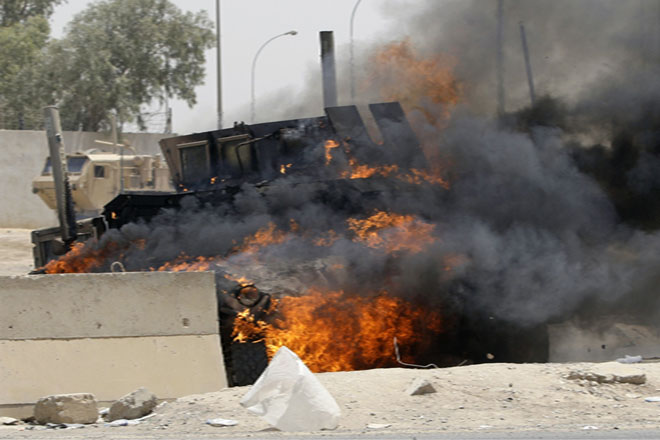Syria has been blamed for a car bombing in Beirut that killed a prominent Lebanese security official and seven others Al Jazeera reported.
Saturday's blast, the worst the Lebanese capital has seen in more than four years, wounded 86 people and was seen as a sign that Syria's civil war is spilling over the country's borders..
When asked who he thought was responsible for the killing, Saad al-Hariri, leader of the opposition March 14 alliance, replied: "Bashar Hafez al-Assad," referring to the Syrian president.
"Who killed Wissam al-Hassan is as clear as day. Certainly the Lebanese people will not be silent over this heinous crime and I, Saad Hariri, promise that I will not be silent."
Walid Jumblatt, Lebanon's Druze leader, also accused Assad of being behind the attack.
"The Syrian regime is expert in political assassinations," he told the AFP news agency. "Our response needs to be political. A president who burns Syria and is the executioner of Damascus does not care if Lebanon burns."
The attack in the Ashrafiyeh neighbourhood killed Wissam al-Hassan, intelligence chief of the Internal Security Forces (ISF), who led an investigation that implicated Syria and Hezbollah in the assassination of former prime minister Rafik al-Hariri, Saad al-Hariri's father.
He also headed an investigation over the summer that led to the arrest of former Information Minister Michel Samaha, an ally of Assad, accused of trying to help smuggle explosives into Lebanon.
Syrian condemnation
Syrian Information Minister Omran al-Zohbi condemned what he called a "terrorist, cowardly" attack. Such incidents were "unjustifiable wherever they occur," he said.
ollowing the attack, clashes occurred in the northern Lebanese city of Tripoli between the rival districts of Jabal Mohsen and Bab al-Tabbaneh, leaving one person dead.
Jabal Mohsen is resided by mostly Alawites supportive of Assad, while Bab al-Tabbaneh is a Sunni area.
Friday's rush-hour car bombing has raised fears of renewed sectarian violence in a country still scarred from a long civil war.
Al Jazeera's Rula Amin, reporting from Beirut, said Hassan was "a very prominent figure in Lebanon" and "a key figure in supporting the armed opposition in Syria".
"This killing will stir a lot of tensions," she said.
The Lebanese government said on Friday that an investigation has been launched into the assassination of Hassan.
The opposition called on the government to resign following an emergency meeting.
"The government must leave and we call on Prime Minister Najib Mikati to resign immediately," said Ahmad al-Hariri, secretary-general of the Future movement.
Meanwhile, the 15-member UN Security Council, in a statement, called the attack a "heinous act" and appealed to the Lebanese people to "preserve national unity in the face of such attempts to undermine the country's stability".
The US described the bombing as a "terrorist attack".
'Strong and sad message'
Ziad Baroud, a former Lebanese interior minister, told Al Jazeera that it was too soon to tell who was behind the deadly car bombing.
"We have no indication whatsoever [of who is behind this]. We know this is a strong and sad message, and we know this could destabilise the whole country," he said.
Michel Pharaon, a Lebanese politician with the March 14 alliance, told Al Jazeera that the coalition may have been a target of the explosion.
"We have had lately some assassination attempts, which has reminded us of the period between 2005 and 2007, and this terrorist act is also a reminder of what used to happen in Ashrafiyeh during these years," he said.
The most prominent car bombing since Lebanon's 1975-1990 civil war took place on February 14, 2005, when a massive blast killed Rafik al-Hariri and 22 other people as his motorcade drove along the Beirut waterfront.






